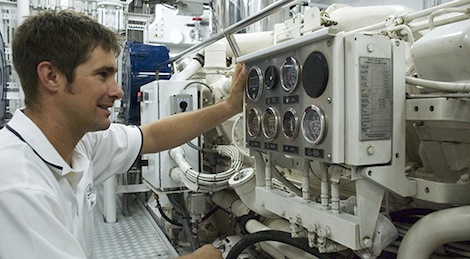Engineering the inevitable
The MCA has begun a series of meetings in order to plan a restructuring of training and certification for engineers across the marine industry. SuperyachtNews.com speaks exclusively to John Wyborn, who attended the first of these discussions in early May, to find out more about what was discussed and what is in store for the future of engineering.…
“The aim is to create an engineering structure that will work across the whole small boat industry (under 3,000gt) and that will allow engineers to continue onto unlimited certification if they wish,” explains Wyborn. “That is what is in the pipeline - exactly how it is going to happen is yet to be confirmed but I know that the MCA are fairly motivated to make it happen. There is another meeting coming up in the next couple of weeks where they are going to discuss it a bit more and try and look into ways of achieving it. The aim is to have some sort of direction by the Monaco Yacht Show, where it will be discussed at the PYA Engineering seminar.”
During the PYA Sea Changes seminar at the Antibes Yacht Show, Captain Roger Towner, chief examiner at the MCA, presented his dedication to the cause. “Engineering is a bone of contention in the yachting industry, so we have been thinking that the current system should be restructured,” he said. “Why should we have a separate engineering certificate for a yacht, a tanker and a fishing vessel when there are many similarities across the board? We are going to try to find some way of getting these qualifications for fairly low level engineers into a scheme that will work across the different sectors of the maritime world.”
While the idea is still in its initial stages, the meeting in early May looked at the various possibilities for the future of training and certification for engineers. “The essence is going to be that they are going to look at reducing the amount of seatime that engineers have to do,” Wyborn explains. “Currently engineers need 42 months yacht service – they are looking at reducing that, but increasing the amount of college time. So there might be more courses, some element of distance learning and there is almost certainly going to be a training record for engineers.”
“There can’t be too much more time in the classroom because that would make it too difficult for them to do it,” Wyborn adds when asked how this will work in the yachting industry. “But what we are doing at the moment is just exam cramming - there is no education going on and unfortunately the exams without the education is the wrong way round. Yachting is now a fully-fledged sector of the marine industry so we need to start acting like one and we need to improve what we are doing on board.”
“Something is going to happen and at this stage the engineers that are interested have a chance to influence it."
When the subject was raised by Captain Towner during the Antibes Yacht Show, it raised some strong opinions from around the seminar room, with a number of captains and engineers keen to voice their own ideas for the future of engineering training. “The bone of contention is the current content of the syllabus; there are so many things involving so much equipment that you would never find on a yacht,” said one member of the audience, and asked whether this was going to be reviewed in the discussions.
“Bearing in mind what the other sectors of the industry want also, this is time to rationalise the systems as nothing is yet written in stone,” replied Towner. “We don’t want to perpetuate something that isn’t working.”
Wyborn stood up to say that he would welcome any input and would be happy to represent them on behalf of the PYA at the upcoming meeting. Interestingly, however, he did not receive any feedback whatsoever. “Something is going to happen and at this stage the engineers that are interested have a chance to influence it,” concludes Wyborn, who wishes to encourage any engineers that do want to have input to speak up soon, and to do so via the PYA.
Profile links
MCA - Maritime and Coastguard Agency / Ensign
Professional Yachtsmen’s Association
NEW: Sign up for SuperyachtNewsweek!
Get the latest weekly news, in-depth reports, intelligence, and strategic insights, delivered directly from The Superyacht Group's editors and market analysts.
Stay at the forefront of the superyacht industry with SuperyachtNewsweek
Click here to become part of The Superyacht Group community, and join us in our mission to make this industry accessible to all, and prosperous for the long-term. We are offering access to the superyacht industry’s most comprehensive and longstanding archive of business-critical information, as well as a comprehensive, real-time superyacht fleet database, for just £10 per month, because we are One Industry with One Mission. Sign up here.
NEW: Sign up for
SuperyachtNewsweek!
Get the latest weekly news, in-depth reports, intelligence, and strategic insights, delivered directly from The Superyacht Group's editors and market analysts.
Stay at the forefront of the superyacht industry with SuperyachtNewsweek




